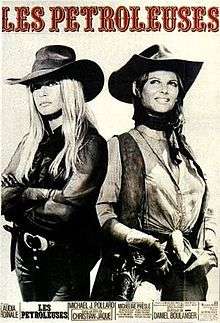The Legend of Frenchie King
| The Legend of Frenchie King | |
|---|---|
 French theatrical release poster | |
| Directed by | Christian-Jaque |
| Produced by |
Francis Cosne Raymond Erger |
| Written by |
Marie-Ange Aniès Daniel Boulanger Clément Bywood Eduardo Manzanos Brochero Jean Nemours |
| Starring |
Brigitte Bardot Claudia Cardinale |
| Music by | Francis Lai |
| Cinematography | Henri Persin |
| Edited by | Nicole Gauduchon |
Release dates | 16 December 1971 |
Running time | 94 minutes |
| Country |
France United Kingdom Italy Spain |
| Language | French |
| Box office | 2,234,479 admissions (France)[1] |
The Legend of Frenchie King (French: Les Pétroleuses) is a 1971 French western comedy film directed by Christian-Jaque and starring Claudia Cardinale and Brigitte Bardot.
Cast
- Claudia Cardinale as Marie Sarrazin
- Brigitte Bardot as Louise a.k.a. Frenchie King
- Michael J. Pollard as Sheriff
- Patty Shepard as Petite Pluie
- Emma Cohen as Virginie
- Térèsa Cimpera as Caroline
- Oscar Davis as Mathieu
- Georges Beller as Marc
- Patrick Préjan as Luc
- Rocardo Salvino as Jean
- Valéry Inkijnoff as Spitting Bull
- Micheline Presle as Aunt Amelie
- Denise Provence as Mlle. Letellier
- Leroy Hayns as Marquis
- Jacques Jouanneau as M. Letellier
- Raoul Delfossé as Le Cornac
- France Dougnac as Elisabeth[2]
Plot
In Bougival Junction, New Mexico in 1880 the Francophone town is led by Marie Sarrazin. A new family arrives, calling themselves the Millers, but in fact they are the daughters of the hanged outlaw Frenchie King and his eldest daughter Louise seeks to keep her father's name alive by donning men's clothing and continuing his criminal ways. Louise and Maria fight but when they are both jailed they team up to take revenge on the town's men.[3]
Reception
The film received generally negative reviews. Bardot's performance in particular was criticised by Jean Loup Passek, who noted how uncomfortable she seemed in the film's outdoors action setting.[4] Writing in Variety Gene Moskowitz dismissed the film as "predictable, naive and gauche" whilst Tom Milne called it "drearily unfunny".[5]
See also
References
External links
| ||||||